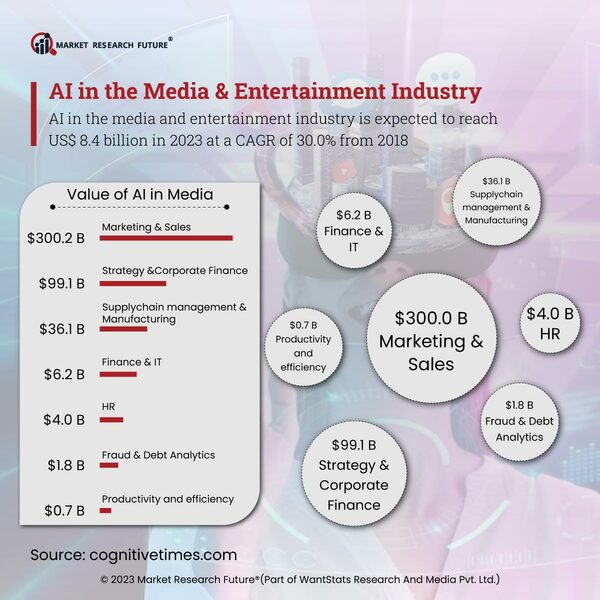Discover how Artificial Intelligence is revolutionizing entertainment: from predictive movie recommendations to virtual actors and beyond!

Image courtesy of Lisa Fotios via Pexels
Table of Contents
Introduction:
In today’s rapidly evolving technological landscape, one significant development that has garnered increasing attention is the growing integration of Artificial Intelligence (AI) in the entertainment industry. As AI continues to advance, its applications are expanding into new territories, revolutionizing various aspects of the entertainment world. From content creation and personalization to immersive experiences and interactive storytelling, AI is transforming how we consume and engage with entertainment. In this article, we will explore the rising role of AI in the entertainment industry and the positive impact it brings.
Transforming Content Creation and Personalization
AI has revolutionized the way content is created and personalized, enhancing the overall entertainment experience for consumers. One remarkable example is the use of AI algorithms to generate music, art, and even movies. With deep learning, algorithms can analyze vast amounts of data, imitate various artistic styles and patterns, and create original content that captivates audiences. This not only expands the creative possibilities but also opens doors for emerging artists who can leverage AI tools to bring their visions to life.
Furthermore, AI algorithms are adept at personalizing content recommendations based on individual preferences and viewing habits. Streaming platforms like Netflix and Spotify employ AI algorithms to analyze user data, understand viewing or listening patterns, and suggest tailored content recommendations. This personalization significantly enhances the entertainment experience, providing users with a curated selection of content that aligns with their tastes and interests.
Immersive Experiences through AI
AI is instrumental in creating immersive experiences that blur the boundaries between the digital and physical worlds. Virtual Reality (VR) and Augmented Reality (AR) have gained tremendous popularity, offering users unique and interactive experiences. AI plays a fundamental role in these technologies, enabling realistic simulations, intelligent object recognition, and seamless interaction.
For instance, in the gaming industry, AI algorithms are employed to simulate human-like behavior, making NPCs (non-player characters) more realistic and responsive. This not only enhances the game’s immersion but also improves the overall gameplay experience. Similarly, AI-powered AR applications can analyze real-time surroundings and overlay digital information or interactive elements, enriching our perception of reality.
Reimagining Interactive Storytelling
AI is reshaping the landscape of storytelling, facilitating interactive narratives that respond to user inputs and choices. This emerging field, known as interactive storytelling or “choose-your-own-adventure” experiences, relies on AI algorithms to create dynamic narratives that adapt to the choices made by the audience.

Image courtesy of www.marketresearchfuture.com via Google Images
Streaming platforms and video game developers are at the forefront of this revolution, incorporating interactive storytelling elements that engage viewers beyond passive consumption. Through AI, these systems are capable of tracking user decisions in real-time and providing relevant content based on their choices. This not only empowers viewers with agency over the narrative but also creates a more personalized and immersive entertainment experience.
The Promise of AI in Accessibility and Inclusion
AI also holds great promise in fostering accessibility and inclusion within the entertainment industry. Through voice recognition and natural language processing, AI-powered devices and interfaces enable individuals with disabilities to interact with entertainment content more effectively. Voice-controlled smart devices, for example, allow individuals with mobility impairments to control their entertainment systems hands-free.
Moreover, AI-driven closed captioning and audio descriptions improve accessibility for individuals with hearing or visual impairments, enabling them to enjoy movies, TV shows, and live performances. By leveraging AI technologies, entertainment providers can ensure their content reaches a wider audience and promotes inclusivity.
The Future of Entertainment – AI and Human Collaboration
While AI continues to make significant strides in the entertainment industry, it is crucial to highlight the collaborative relationship between AI and human creators. AI algorithms excel at processing vast amounts of data and generating creative content. However, they lack the human touch and emotional depth that human creators bring to the table.

Image courtesy of www.linkedin.com via Google Images
Ultimately, the integration of AI in entertainment should aim to enhance human creativity rather than replace it. By harnessing the power of AI as a tool, human creators can push the boundaries of their own creativity, leveraging AI-generated content as inspiration and building upon it to create truly remarkable and unique experiences.
Conclusion
The rising role of AI in the entertainment industry is paving the way for exciting possibilities. Through AI, content creation and personalization have reached new heights, immersive experiences have become more accessible, interactive storytelling has entered a new era, and inclusion has been championed. As AI technology continues to advance, we can anticipate even more innovative applications that enhance how we consume and engage with entertainment. Harnessing the symbiotic relationship between AI and human creators, the future of the entertainment industry promises awe-inspiring experiences that captivate and inspire audiences like never before.
